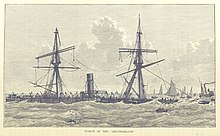Constantin Maria von Droste zu Hülshoff
Constantin August Maria von Droste zu Hülshoff (born January 22, 1841 in Münster , † December 30, 1901 in La Crosse , Wisconsin , USA ) was a German Franciscan minister in the diocese of La Crosse .
Life
Constantin August Maria Freiherr Droste zu Hülshoff was the fifth child of the ophthalmologist Joseph Maria Freiherr Droste zu Hülshoff (1789-1850), until 1843 landowner of Haus Alst and Grollenburg, and Maria Anna Julia (Julie) Kock (1810-1881). He belonged to the 21st generation of his family and was a brother of the writer Therese Dahn , a grandson of the composer Maximilian-Friedrich von Droste zu Hülshoff and a second nephew of the poet Annette von Droste-Hülshoff . The poet who attended his baptism suggested his first name August Maria and described him as the biggest child of six months she had ever seen. He was also a first-degree nephew of the university professor and rector of the University of Bonn Clemens-August von Droste zu Hülshoff , his father's older brother.
After his father's death, he lived with his mother and siblings - including Therese Dahn - in Veitshöchheim , where one of his brothers, Werner, was the manager of the court garden at Veitshöchheim Castle . The family grave is located in the local cemetery. 20 years old, on July 31, 1861 in Braunsberg (Warmia / East Prussia) he passed the Abitur at the "Royal Catholic High School", which was later renamed the Lyceum Hosianum (there were close ties between the Diocese of Münster and the Diocese of Warmia during this period Relationships). Constantin August Droste zu Hülshoff first tried to become a priest in his family home, Münster . For his livelihood, he wanted to claim the so-called hereditary vicariate of the “Rudolf-von-der-Tinnen Foundation”. The foundation refused to do this, despite the best credentials from the Bishop of Munster because of his descent from a middle-class mother. He lost a civil law suit against this decision of the foundation. He began studying theology at the University of Würzburg in 1862 , entered the seminary there in 1863 and received minor orders in 1864 . In 1864 he entered the Collegium Germanicum et Hungaricum in Rome , where he was ordained priest in 1867 . He was the only member of his family who permanently emigrated to the United States . In 1896 he went on a boat trip to Germany, during which he confessed to his sister Therese after her testimony that he actually wanted to study medicine .
Act
During his short time as chaplain in St. Gertraud in Würzburg , Constantin von Droste zu Hülshoff entered the Order of the Minorites in 1869 and went to the USA as a missionary in September 1869 . According to a report in the Augsburger Postzeitung No. 214 of September 11th, 1869, he embarked on September 4th from Bremen for America with a group of other Minorites under the direction of the mission superior and later Bishop Fidelis Dehm . The crossing was not without danger, as the sinking of the steamer Deutschland , in which missionaries died in 1875 , should show. In addition to pastoral care, his work included the construction and decoration of the church buildings in his parishes. First he worked as a pastor in Mequon in the Diocese of Milwaukee , from 1877 in various Catholic parishes in the Diocese of La Crosse. In Genoa Township in Vernon County he worked at St. Charles Borromeo Catholic Church and also ran the household of a widowed father of two children. Most recently he worked at St. Mary's Catholic Church in Keyesville, Richland County . He died on December 30, 1901 in St. Francis Hospital in La Crosse and is buried in a crypt under the altar of the Chapel of the Blessed Virgin of the Seven Dolors in the Catholic Cemetery in La Crosse. His grave is adorned with the coat of arms and the motto of the Droste zu Hülshoff family. In an obituary in the Rice Lake Leader newspaper, he was described as a man of birth and character who had given up a carefree and comfortable life to become a priest. He had outstanding skills and a pleasant demeanor. He had a wide horizon and was popular outside of his church. His memory lives on in the local parish.
literature
- Rice Lake Leader. State Historical Society of Wisconsin, La Crosse, Jan. 9, 1902, obituary.
- Republican Observer. La Crosse, January 9, 1902.
- La Crosse Leader Press. La Crosse, January 2, 1902.
- Daily Republican and Leader. La Crosse, December 31, 1901.
- 1900 United States Federal Census. Source Citation: Year: 1900; Census Place: Genoa, Vernon, Wisconsin; Roll: T623 1820; Page: 9B; Enumeration District: 158.
- Wilderich von Droste zu Hülshoff : Annette von Droste-Hülshoff in the field of tension of her family. Limburg 1998.
- Wilderich from Droste to Hülshoff: 900 years of Droste to Hülshoff . Verlag LPV Hortense von Gelmini, Horben 2018, ISBN 978-3-936509-16-8
Web links
- private website for Droste zu Hülshoff (English)
Individual evidence
- ↑ Hans-Christoph Surkau: "High school graduates of the Gdansk government district" (QMS No. 23 / 1–2).
- ^ Scan from the Augsburger Postzeitung , page 1666 of the 1869 year
| personal data | |
|---|---|
| SURNAME | Droste zu Hülshoff, Constantin Maria von |
| ALTERNATIVE NAMES | Droste zu Hülshoff, Constantin August Maria von (full name) |
| BRIEF DESCRIPTION | German Franciscan |
| DATE OF BIRTH | January 22, 1841 |
| PLACE OF BIRTH | Muenster |
| DATE OF DEATH | December 30, 1901 |
| Place of death | La Crosse , Wisconsin, United States of America |


